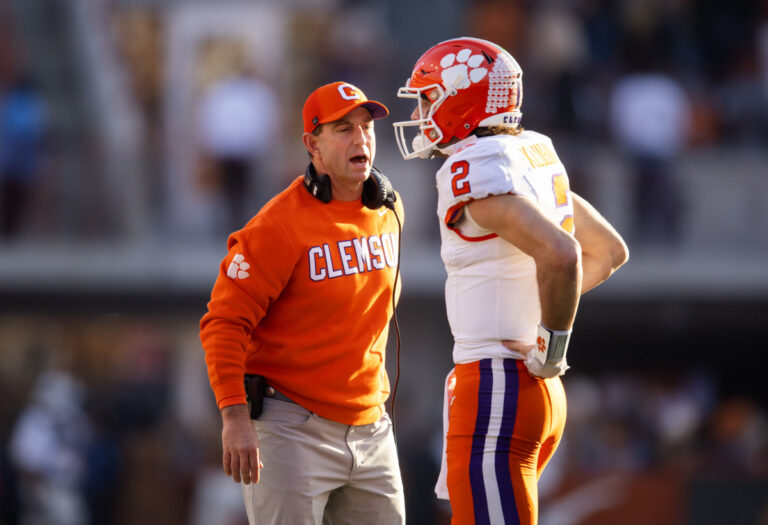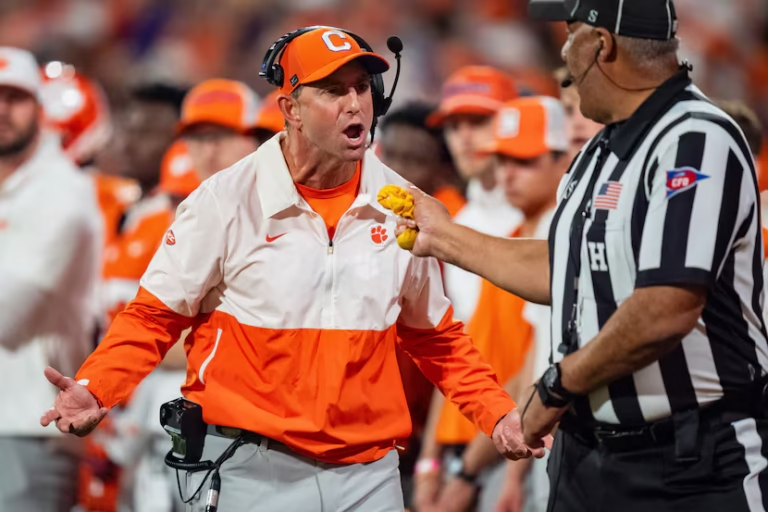
Dabo Swinney Announces Retirement After the Game: A Career of Excellence and Legacy in College Football
In a move that sent shockwaves through the college football world, Dabo Swinney, one of the most successful and beloved coaches in recent history, announced his retirement after the game. His decision to step away from coaching following a career filled with remarkable achievements, transformative leadership, and unparalleled success has left a void in college football. Swinney’s impact on the sport, the Clemson Tigers program, and the broader college football landscape cannot be overstated. This is the story of his illustrious career, the reasons behind his retirement, and the lasting legacy he leaves behind.
Dabo Swinney: A Rapid Rise to Prominence
Dabo Swinney’s journey to becoming one of the most successful head coaches in college football is a story of perseverance, belief, and hard work. Swinney, born William Christopher Swinney in 1970, had a love for football from a young age, playing the game in high school and eventually at the University of Alabama. Though he was not a star player, Swinney’s passion for the game and his natural leadership abilities were evident early on.
After his playing career ended, Swinney found his calling in coaching. He started as a graduate assistant at Alabama under legendary coach Gene Stallings, but it was under Nick Saban, who arrived at Alabama in 2007, that Swinney’s coaching abilities truly flourished. Swinney quickly rose through the coaching ranks, becoming the wide receivers coach and eventually taking over as the head coach of the Clemson Tigers in 2008, following the midseason departure of Tommy Bowden.
At the time of his appointment, few expected Swinney to have the immediate success that he would soon achieve. The Clemson Tigers were a solid football program, but they were not a powerhouse. However, Swinney’s infectious personality, deep understanding of the game, and relentless drive to succeed quickly transformed the program into a national contender. His rise was meteoric, and by the end of his first full season, it was clear that Swinney had a rare ability to inspire and lead.
Building a Clemson Dynasty
One of the defining features of Swinney’s coaching career was his ability to build and sustain a dynasty at Clemson. Over the course of his tenure, he consistently brought in top-tier talent, developed players into future NFL stars, and created a culture of excellence that permeated the entire program. From his first full season as head coach, it was clear that Swinney had a vision for Clemson football that went beyond simply winning games. He wanted to create a program that would compete for national championships year after year, a vision that became a reality in the years that followed.
Under Swinney’s leadership, Clemson consistently recruited some of the best players in the country. His ability to connect with recruits, sell the vision of playing for a championship-caliber team, and create an environment where athletes could thrive was central to Clemson’s rise. His recruiting classes were consistently ranked among the best in the nation, and many of those recruits went on to have standout careers, both at Clemson and in the NFL.
Swinney’s focus on player development was also a key component of his success. His staff worked tirelessly to help players grow not only as athletes but as individuals. He was known for his mentorship, his ability to develop quarterbacks, and his willingness to foster competition at every position. It was no surprise that some of the best players in college football, such as Deshaun Watson, Trevor Lawrence, and Sammy Watkins, came through Swinney’s system and went on to achieve greatness in the NFL.
One of Swinney’s most significant achievements came in the 2015 season when he led Clemson to a College Football Playoff appearance, ultimately losing to Alabama in the national championship game. The team’s performance that season put Clemson on the map as a national power and set the stage for even greater accomplishments in the years to come.
The pinnacle of Swinney’s career came in 2016, when Clemson won its first national championship in over three decades. The Tigers’ thrilling victory over Alabama in the College Football Playoff National Championship game was a culmination of years of hard work, recruiting, and developing talent. The victory not only solidified Swinney’s status as one of the best coaches in college football but also marked the beginning of a new era of dominance for Clemson.
Swinney and his team would continue to dominate college football in the years that followed. They won two more ACC championships and another national title in 2018, cementing Swinney’s legacy as one of the most successful and respected head coaches in college football history.
The Impact of Dabo Swinney’s Leadership
What set Dabo Swinney apart from many other coaches in college football was his unique leadership style. While many coaches are known for their intense, often authoritarian approach, Swinney’s leadership was defined by his genuine care for his players, his unwavering belief in the power of positivity, and his unshakeable faith. Swinney was known for his motivational speeches, his infectious energy, and his ability to bring out the best in his players, even in the most challenging circumstances.
One of the core principles of Swinney’s leadership was his emphasis on family. He often referred to his team as a “family,” and he made sure that his players felt supported both on and off the field. Whether it was providing guidance during tough times or celebrating the successes of his players, Swinney’s approach to leadership fostered a sense of community within the team. His commitment to developing not only great football players but also great individuals was evident in the culture he built at Clemson.
Swinney also made a concerted effort to build strong relationships with his players and staff. His open-door policy, his constant communication, and his emphasis on accountability created a culture of trust and respect. Players were inspired by his passion for the game and his commitment to making them better both as athletes and as people. Swinney’s coaching staff, too, flourished under his leadership, with many of his assistants moving on to become head coaches or coordinators at other programs.
Beyond the X’s and O’s of football, Swinney was a master at getting his team to buy into his vision. He focused on building a culture of hard work, humility, and perseverance, and he was a master at motivating his players to push through adversity. His teams consistently played with a chip on their shoulder, a sense of purpose, and a desire to prove themselves on the biggest stages. It was this culture that allowed Clemson to sustain success over such a long period and compete at the highest level.
Why Dabo Swinney Retired
After a career filled with achievements, championships, and countless memories, Swinney’s decision to retire shocked the college football world. While he had continued to lead Clemson to success, it became clear that Swinney had reached a point in his life where he was ready to step away from the grind of coaching. In his retirement announcement, Swinney cited several reasons for his decision, all of which pointed to a natural desire to spend more time with his family and to step away from the high-pressure demands of college football.
Swinney admitted that while he loved coaching and had poured his heart and soul into building Clemson into a powerhouse, he felt that it was time for him to transition into a new phase of life. With his children growing up and his family needing more of his time and attention, Swinney realized that it was time to prioritize his personal life over the demands of the profession.
Another key factor in his decision to retire was the changing landscape of college football. Swinney had been a vocal critic of various trends in the sport, such as the growing influence of the transfer portal and the rise of name, image, and likeness (NIL) deals. While he had adapted to these changes, it became apparent that the game was evolving in ways that were increasingly difficult for him to navigate. Despite his success on the field, Swinney expressed a sense of frustration with the direction the sport was headed and believed it was the right time for him to step away.
The Legacy of Dabo Swinney
Dabo Swinney leaves behind a legacy that will be remembered for generations. As one of the most successful head coaches in college football history, his achievements on the field are undeniable. Two national championships, multiple ACC titles, and a consistently high-performing program are just a few of the markers of his legacy. His ability to build a championship-caliber program from the ground up is a testament to his vision, leadership, and determination.
But Swinney’s legacy extends far beyond his wins and losses. He will be remembered for his positive influence on his players, his ability to inspire, and his unwavering commitment to the values of hard work, faith, and family. His impact on the Clemson Tigers program is immeasurable, and the foundation he built will continue to serve the team for years to come.
Swinney’s decision to retire marks the end of an era for Clemson football, but his influence will live on. His legacy will be felt not only through the success of his teams but through the countless lives he touched during his time as head coach. As college football continues to evolve, Dabo Swinney’s place in the history of the sport will be firmly cemented, and his legacy will continue to inspire future generations of coaches and players alike.
Conclusion
Dabo Swinney’s retirement marks the end of an extraordinary chapter in college football history. With his infectious energy, unparalleled coaching ability, and deep commitment to his players and their development, Swinney transformed Clemson into one of the most dominant programs in the sport. His legacy, defined by his championship titles, leadership, and values, will endure long after his retirement. As college football enters a new era, the impact of Dabo Swinney will continue to resonate, reminding us of the power of belief, perseverance, and the love of the game.





